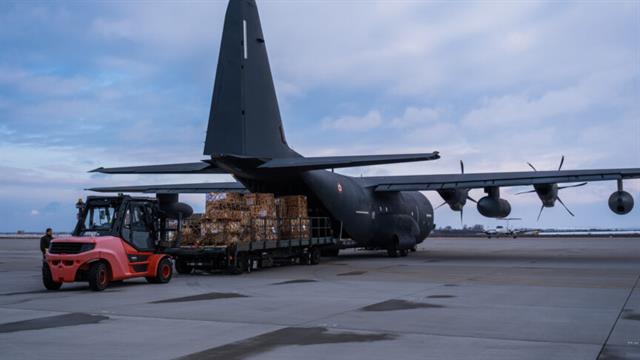 A forklift helps prepare military equipment for Ukraine PHOTO: NATO
A forklift helps prepare military equipment for Ukraine PHOTO: NATOThere’s no doubt that 2022 was a difficult year for materials handling, logistics and many other sectors of the economy.
Major challenges, according to John Paxton, CEO of the US-based industry group MHI, included ongoing supply chain disruptions, workforce challenges, inflation and the challenges of matching capacity to shifting consumer demands.
“These challenges make it difficult to forecast demand, manage wages and to control supplier inflation,” he says.
“The geopolitical impact on Europe resulting from the invasion of Ukraine, the China-Taiwan tensions and the Chinese COVID policies could further extend the disruptions and the inflationary pressures, specifically in semi-conductor components, energy and food, well into 2023,” he warns.
John L. Gelsimino, chairman of MHEDA, has similar observations about 2022, citing inflationary pricing, supply chain disruptions, employee acquisition, retention and mental health issues from pressures inside and outside of the workplace as major challenges. “To say 2022 was challenging would be an understatement. But I still consider these somewhat good problems. In my view, challenges in years past related to an economic slowdown and everything associated with that is much worse,” he explains.
David Goss, technical director of UKMHA, also highlights the impact of geopolitical developments in 2022: “The economic outlook at the beginning of the year was extremely positive with a strong recovery forecast. This was unfortunately disrupted by supply chain constraints, the war in Ukraine, domestic political upheaval and rising inflation which combined to make actual market conditions unexpectedly challenging.”
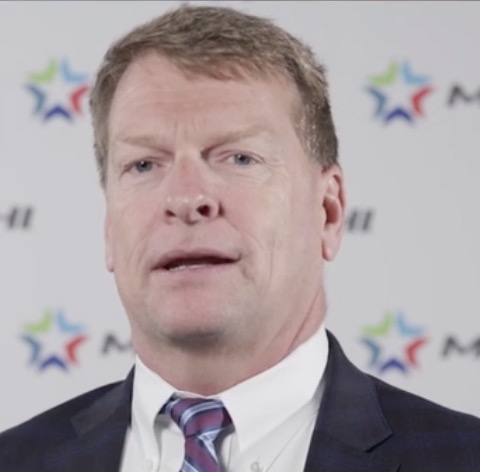 John Paxton
John Paxton
Closer to home, Goss says the looming end of the validity of CE marking looked like being the greatest challenge in 2022. “However, a last-minute government U-turn has now extended the deadline for a further two years until 31 December 2024.”
For industry training association AITT, lingering instructor shortages have led to longer wait times for operator training and an intensified hunt for new instructors.
“At the same time, the demand for operator training has been at an all-time high. Rising operational demand within materials handling and logistics means sites require more staff to work at busy sites. But labour shortages due to Brexit and the pandemic mean companies may be relying on new, temporary or agency workers, who all require training,” says Liam Knight, managing director of AITT.
“There has been a backlog in training since the pandemic, and the long wait times mean some customers may be tempted to opt for training providers who are not accredited. This is not advisable. Businesses should not compromise on the quality of training they receive, as it could mean operators do not have the appropriate skills and knowledge required to operate workplace transport safely.”
Training was also high on the agenda of the Lifting Equipment Engineers Association (LEEA). “2022 began with the launch of the Level 3 Lifting Equipment Technician apprenticeship standard in England, which provides an answer to the long-standing challenge of establishing a pathway for new recruits into the Lifting Industry,” says CEO Ross Moloney.
“In the UK, changes brought about by Brexit led to the introduction of UKCA marking, which created issues for the lifting sector. LEEA played a significant role in working constructively with government towards a solution to these issues, and continues to enjoy a good relationship with the Department for Business, Energy & Industrial Strategy (BEIS),” he adds.
Financial performance
Global equipment sales in 2022 were tipped to fall slightly from 2021 – 2.25 million units compared to 2.34 million, according to World Industrial Truck Association (WITA) data, but when the final tally comes in, it may be even lower because of the impact of the war in Ukraine, ongoing supply chain challenges, rising energy costs and inflation.
That, however, didn’t stop the big players reporting growth in orders, sales, and revenues during 2022.
Jungheinrich recently reported a “solid third quarter”, with orders up 23% against the end of 2021.
Hyster-Yale has reported third-quarter 2022 revenues increasing by 13.1% from the same time last year, while unit shipments grew by 5.6%.
KION’s order intake rose 2% from the same period last year, as revenue rose by 9.4%.
Nonetheless, most of the manufacturers were hesitant to predict further growth, with many cautioning that the global economy was slowing and demand was likely to be contained.
One development which emerged in the difficult 2022 business environment was dynamic pricing, with KION among the first to introduce the fluid pricing model and Palfinger flagging a shift to dynamic pricing from the start of 2023.
Mergers and acquisitions
The biggest mergers and acquisitions news of 2022 was the cancellation of the planned merger between Cargotec and Konecranes. After struggling to gain regulatory approval in all their markets, the two companies finally hit a hurdle when the UK Competition & Markets Authority (CMA) blocked the union.
Another mega-merger which didn’t make it out of the blocks was Ritchie Bros. Auctioneers, which was forced to scrap its takeover bid of Euro Auctions. This deal was also squashed by the CMA which had concerns that the proposed deal could reduce competition in the UK market, which could result in higher prices for the companies’ customers and lower quality service.
“Ritchie Bros. and Euro Auctions are the two biggest auction service providers for used heavy equipment in the UK and are relied on by businesses across the country,” the authority said.
One area of increased acquisition activity in 2022 was equipment hire. As demand for hire equipment rose in almost all geographies, buyouts intensified, with UK-based Briggs Equipment especially active.
In February, Briggs completed the acquisition of Aerial Platform Hire Limited, one of Ireland’s leading powered access hire companies. In May, it followed up with the acquisition of powered access equipment specialist Access Plus and its sister company, TrainingPlus, a nationwide training and skills provider.
The acquisition trail continued in September, when Briggs Equipment completed the acquisition of Galway Plant and Tool Hire (GPT), one of Ireland’s largest and most successful plant, commercial vehicle and tool hire specialists.
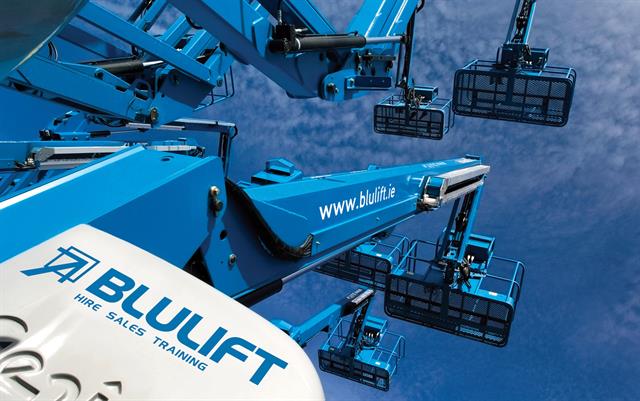 Briggs Equipment acquired Blulift
Briggs Equipment acquired Blulift
Briggs ended the year with another Irish acquisition to its name: Blulift, one of the Republic of Ireland’s leading regional providers of powered access equipment.
In another hire sector development, Sunbelt UK acquired Media Access Solutions to expand its capabilities for the film and TV market. MAS is a specialist equipment hirer for the media and film industries, with depots close to production facilities at Pinewood, Shepperton, Elstree, Longcross, 3 Mills, Bottleyard Bristol, Media City Manchester, BBC Glasgow and ITV Leeds.
And while others were growing the market, Dutch equipment hire specialist Riwal announced its plans to quit the UK market. The company said after 13 years’ activity in the UK, it was “actively considering a plan to cease … operations in the UK as per 1 January 2023”.
The plan is based on the long-term outlook of the UK rental market and the small market position of Riwal UK.
In November, Manitou Group acquired 100% of the shares in the Italian company GI.ERRE SRL, based in Castelfranco, and specialising in service activities for Manitou products. With this purchase, the group says it will enhance the service quality it provides to its customers in that region. Earlier, Manitou Group confirmed the purchase of all the intellectual property of French firm ATN Platforms, a specialist in the design and assembly of aerial work platforms, in particular vertical platforms, in the framework of a judicial recovery procedure before the Commercial Court of Agen.
In December, Manitou Group acquired an 82% stake in easyLi, a specialist in the design and production of lithium ion batteries. Manitou believes the purchase will extend its competence with business lines dedicated to R&D and the production and reconditioning of these batteries.
Also in the battery space, Sunlight Group Energy Storage Systems acquired 51% of the share capital of Triathlon Holding. The acquisition, subject to approvals, should result in a much larger presence for the Greek-based group which aims to pursue a leadership role, mainly in Europe and the US, significantly contributing to decarbonisation and energy security, building on scalable production and innovation capabilities, in both lead acid and lithium ion batteries.
Fleet expansions
The equipment supply market was extremely tight for much of the year, with extremely long delivery times quoted at the start of the year. This led to some creative solutions, including the purchase of refurbished machines.
In February, CK Food Stores, the largest independent food retailer in South West Wales, upgraded the materials handling equipment at its Llanelli warehouse and distribution centre with the acquisition of a fleet of refurbished Toyota powered pallet trucks.
With ongoing global supply chain issues leading to longer lead times for all types of new materials handling equipment, Toyota Material Handling UK noted that demand for its pre-owned forklifts was at an all-time high as truck users look to second- or third-life machines to support their fleets.
“We're seeing a significant increase in the number of companies that opt for ‘blended’ fleets – a mix of new and used machines,” said Stuart Reilly, TMHUK rental and used director.
In January, Jungheinrich opened its second used equipment refurbishing plant in Ploiesti, Romania. With the new site, which covers some 5,000 sqm, the company hopes to meet the growing demand for second-hand materials handling equipment and create capacity for further growth.
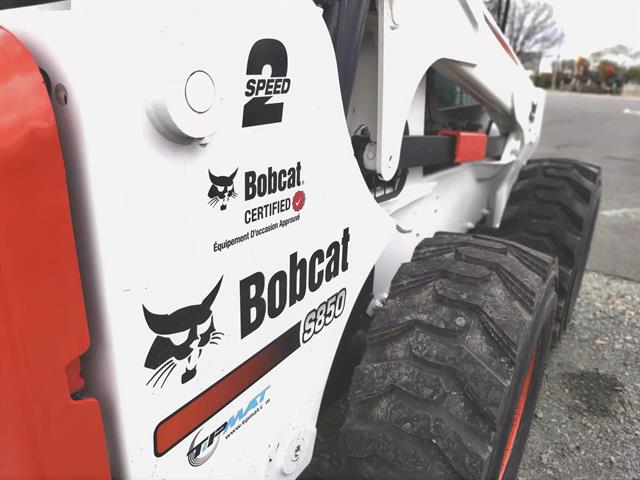 Bobcat noted increased demand for used equipment
Bobcat noted increased demand for used equipment
In May, Bobcat stepped up its used equipment sales, with the launch of Bobcat Certified, the company’s new certified pre-owned program. Following a successful pilot introduction, Bobcat began to supply these Bobcat Certified used machines in the UK and Ireland, France and Germany, through its authorised dealers.
At the same time, B&B Attachments began urging forklift owners to consider used attachments as a cost-effective way of upgrading their equipment.
The UK-based attachment maker said it was in a unique position to provide reconditioned clamps to meet its customers’ requirements.
In July, French aerial work platform maker Haulotte started offering refurbished equipment through its RESTART by Haulotte program, designed to meet the growing demand for Haulotte-branded reconditioned aerial work platforms.
The increased activity in the refurbished equipment market also saw Linde, one of the pioneers of factory-refurbished forklifts, launch a new program of upgrades for its used equipment. Linde has scrapped its Plus, Super and Ultra designations in favour of a uniform, “Approved Trucks” remanufacturing standard. Before a used truck is granted the “Approved Trucks” seal of quality, it undergoes a rigorous inspection and remanufacturing process.
By September, the Bolzoni Group had a Used & Rental portal active in nine European countries.
Supply chain constraints also saw increased demand for equipment rental, prompting a number of significant fleet expansions, especially in the UK.
In June, one of the UK’s leading equipment rental firms invested in a fleet of brand new JCB rotating telehandlers in a deal worth more than GBP5 million (USD6.13 million) – the biggest order so far for the new product. Charles Wilson Engineers ordered 25 machines including the 21-m 555-210R and 26-m 555-260R machines. Supplied by dealer Greenshields JCB, the new machines are operating for CW Plant’s customers across the UK.
In other significant orders, Hiab received a significant repeat order in July for Moffett M8 55 NX truck-mounted forklifts in the US. The EUR16.8 million (USD17 million) order was placed by one of the country’s largest building materials supply companies that also made a significant order with Hiab in Q1 2022.
In June, Chinese forklift maker Heli delivered a significant order of equipment to a leading South American customer. The 500 Li-ion forklifts were modified to take into account the laws and regulations of various countries and regions, emission policies and customer configuration requirements.
The company followed up with a delivery of nearly 100 forklifts to a South East Asian customer. Most of the forklifts joining the fleet of the well-known chemical company were Heli G3 series 4-5 T lithium battery products.
In March, the Ziegler Group, one of Europe’s largest sawmill operators, renewed its forklift fleet, replacing around 25 of its Hyundai vehicles with new models.
Automation orders also rose in 2022, with global transport and logistics provider Geodis and Locus Robotics announcing a new expansion agreement to deploy 1,000 LocusBots at Geodis’ worldwide warehouse locations over the next 24 months. This represented one of the industry’s largest AMR deals to date.
In June, Dematic was awarded a contract to provide warehouse automation for omnichannel retailer Radial Europe. The supplier of intelligent automation technology will deliver 299 autonomous mobile robots (AMRs) to Radial’s logistics centre in Groningen, Netherlands. The transport robots will take over automatic pallet and tote conveying to the transfer stations and picking stations. Dematic is also installing 45 pick and pack stations at the centre .
Meeting again
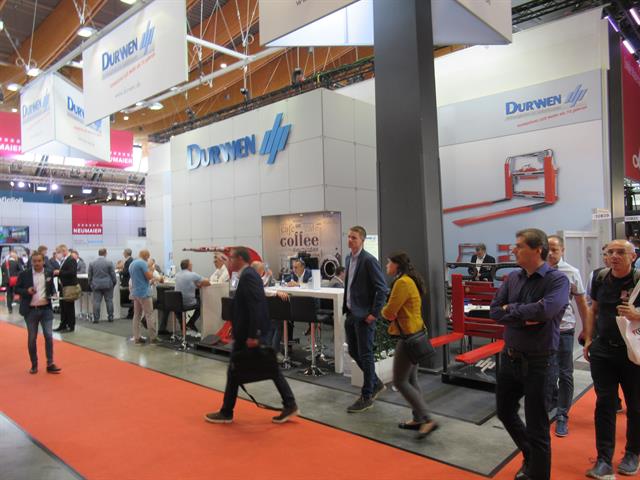 Supply chain challenges was a hot topic at LogiMAT
Supply chain challenges was a hot topic at LogiMAT
2022 saw the return of industry events, and Forkliftaction attended the first in-person LogiMAT since 2019.
The three-day event attracted 1,571 exhibitors from 39 countries, with displays spread across 125,000-plus sqm in all 10 exhibit halls at the Stuttgart showgrounds.
Organisers estimated the attendance at around 50,000 and we reported that there was one topic looming behind almost every conversation: supply chain issues.
Virtually every exhibitor had been affected by the double whammy of a shortage of and price blow-out for steel and the continuing paucity of computer chips required in a growing range of applications in most machines.
The war in Ukraine and the sanctions imposed on Russia caused a shortage in the global steel supply and saw prices spiralling, but the good news just after the show was that the European steel price began easing.
The year also saw the resumption of the IMHX show in Birmingham, the first face-to-face event held under the auspices of the UKMHA, formed from the merger of the British Industrial Truck Association (BITA) and the Fork Lift Truck Association (FLTA).
“We are very pleased that all of these events (UKMHA and the Archies) were very well attended, and the value of physical meetings was clear. Obviously, virtual meetings will continue to be a useful tool, but it is possible to achieve much more with people in the same room,” said David Goss of UKHMA .
Organisers classified MODEX 2022 as their best event to date, with more than 37,000 visitors attending the gathering at Atlanta’s Georgia World Congress Center.
Visitor attendance was up 20% on the last pre-pandemic show, MODEX 2018.
“MODEX 2022 was a huge success and a dramatic return to in-person events for the supply chain industry,” said John Paxton, CEO, MHI. “After two years, exhibitors and attendees were excited to be there and energised by the opportunity to connect and get back to the business of discovering the latest supply chain technology and innovation in person.”
In June, Linde Material Handling hosted ‘several thousand’ customers and prospects from around the world at its World of Material Handling (WoMH) event in Mannheim.
Over an area of 17,000 sqm at the Mannheim Maimarkt site, the intralogistics specialist presented its extensive portfolio of products, solutions and services over nine days.
The LEEA resumed its events in late 2021 with the standalone LEEA Awards, but October 2022 saw the return of its flagship LiftEx events, together with the 2022 Awards, in Aberdeen.
Last year’s TOC Europe event, the first in three years, attracted around 3,500 attendees from over 80 nations.
A new safety event, the Safety in Logistics Digital Conference, was streamed live on 23 November 2022. The event brought together experts and solution providers with decision makers and safety professionals who were eager to learn how to make their operations as safe as possible.
In Brazil, the Latin American Congress of Ports (AAPA Latino) event set an attendance record, with more than 800 delegates from 30 countries over three days. The event included a trade show which brought together more than 100 suppliers from the logistics and maritime sector.
A helping hand
The headlines were dominated by war and natural disaster in 2022, and materials handling stepped up to help.
In addition to imposing economic sanctions on Russia in response to its attack on Ukraine, forklift makers rallied in support of Ukraine relief initiatives.
Combilift teamed up with the Ukrainian Red Cross Society, making an initial contribution of EUR50,000 (USD55,000) to aid the supply of relief assistance to the civilian population, including people displaced and people on the move.
There were similar gestures from Uplifting and Cascade, while KION donated EUR1 million (USD1.09 million) to the German Red Cross, to ensure that the suffering population received the necessary support as quickly as possible.
Equipment hirers, particularly those in the UK, also rallied to support Ukraine through the Plant and Hire Aid Alliance. The Alliance arranged deliveries of supplies to Ukraine, working with groups like Rotary International.
In the latter part of the year, vast regions of the United States were devastated by Hurricane Ian, which left at least 150 fatalities in its wake, including 139 in Florida. Logistics support group ALAN responded to the disaster, as it had previously to Hurricane Fiona, the Jackson water crisis, and flooding in Kentucky.
The group co-ordinated the collection of supplies and relief materials, including arranging warehouse space, forklifts, pallet jacks and rough-terrain stackers as well as trucks and trailers. Meanwhile, Toyota Material Handling and its partner companies raised USD100,000 for the American Red Cross to support communities affected by the devastation of Hurricane Ian.
Later, Noblelift North America donated three PTE45N lithium ion-powered pallet trucks to the Harry Chapin Food Bank in Fort Meyers, Florida, in the wake of Hurricane Ian.
Milestones
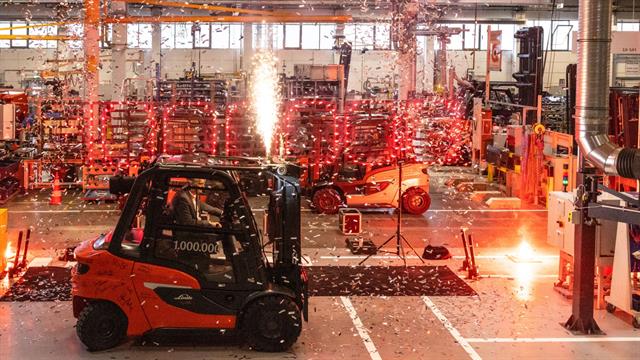 Linde staff celebrate the production milestone
Linde staff celebrate the production milestone
2022 was a year of significant milestones and anniversaries.
In September, Dutch forklift attachments and logistics solutions supplier Meijer Handling Solutions began marking its 100th anniversary.
Meijer Group started as a one-man business in 1921, founded by Jan Meijer in the Frisian village of Wier. Meijer initially focused on local agriculture, before moving into contracting and earthmoving, carrying out repairs and developing new machines and machine parts.
The business later shifted its focus towards mechanical engineering and construction.
Meijer Handling Solutions, now under the direction of the fourth generation, specialises in the production of logistics solutions from its base in Sint Jacobiparochie, where it employs approximately 170 people.
In July, around 15,500 guests attended the JCB Family Festival, staged as a ‘thank you’ to thousands of UK employees past and present. JCB had originally intended to celebrate its 75th anniversary in 2020, but plans for a party had to be put on ice for two years due to the COVID-19 pandemic.
In June, Lift-Tek Elecar, founded in 1972 in Italy, celebrated its 50th anniversary. A subsidiary of Cascade Corporation since its acquisition in October 2021, the company traces its history to a small warehouse in Castel San Giovanni, Italy. Currently based in Piacenza, Italy, Lift-Tek Elecar employs 230 people.
In October, Swiss materials handling dealer Arbor AG celebrated its 60th anniversary with three days of festivities at its premises in Lindental, Bern. More than 1,000 people joined the celebrations, marking a journey which began in 1962 with a sideloader from the Swedish brand LMV, and sees the family company currently employing over 65 people and offering a diverse range of products, including forklifts, four-way forklifts, telehandlers, heavy-duty forklifts, transportable forklifts and work platforms.
Also marking 60 years that month was US dealer group Wolter, Inc. The Wolter, Inc. story began in 1962, when Otto Wolter founded LPM Parts & Service, later named Wisconsin Lift Truck, out of a two-car garage in Milwaukee, Wisconsin.
In 1995, Otto Wolter began looking to accelerate growth through acquisition, starting with Fiorenza Material Handling, Illinois and adding another dozen entities before acquiring Valley Industrial Crane in Ohio this year.
In December, Wolter again broadened its offerings by acquiring Ohio-based dock and door equipment and service provider Ohio Valley Maintenance LLC, which supplies dock and door equipment, as well as comprehensive service and support from factory-trained service technicians for all makes and models of dock equipment, including installation.
And in February, Kaup marked its 60th anniversary. Started in 1962 with five employees, the medium-sized family business from Aschaffenburg now employs around 900 people worldwide. Managing director Holger Kaup noted that the market environment for attachments has changed considerably over the past six decades: "It is more competitive than ever."
In April, Manitou UK also marked half a century, after becoming the group’s first international in 1972 under the name Manitou Site Lift Limited. In 1980, Manitou Site Lift Ltd expanded to its current premises in the town of Verwood, near Southampton.
The company also celebrated the 30-year anniversary of its Manitou Benelux subsidiary based in Perwez in Belgium. The third subsidiary of the group, founded in 1991 after the United Kingdom and Italy, provides technical and commercial expertise to Manitou and Gehl dealers based in Belgium, the Netherlands and Luxembourg.
Also in April, the founders of truck-mounted forklift maker ABT Loadmac visited the Hereford company they started 50 years ago. Anthony Beach Thomas and Roger Gates were impressed by how the business has evolved.
The founders were especially taken with the manufacture of the Loadmac forklifts which are 100% manufactured by ABT from raw steel to finished machine, and exported all over the world.
In November, Dematic celebrated 50 years of operations in Asia. Milestones include Dematic rolling out the first automated system in Singapore in the 1970s, the first AS/RS in Malaysia in the 1980s, the first AS/RS in India in 2007, and the largest high-speed automated sorter in Asia commissioned in Korea in 2005.
Production milestones through the year included Jungheinrich’s 100,000th Li-ion truck. The significant ETV 216i reach truck was delivered as part of an order of 16 identical trucks to the Amazon warehouse in Leipzig, where 140 other Jungheinrich electric trucks are already in use.
In May, Canada’s Delta-Q Technologies announced the shipment of its four millionth battery charger. With each charger representing the potential to save one metric ton of emissions, this significant milestone equates to 4 million metric tons of carbon emissions saved since the company’s founding, further cementing its imprint on global electrification and sustainability.
In September, Locus Robotics surpassed the one billion units picked milestone. The achievement was attained just 59 days after Locus registered 900 million units picked.
It took Locus 1,542 days to pick its first 100 million units and just 59 days for the last 100 million picks.
At the time, LocusBots had travelled more than 17 million mi. (27.4 million km) in customers’ warehouses, the equivalent of more than 670 times around the earth or 35 round trips to the moon.
In November, Kalmar Ottawa sold its 80,000th terminal tractor. The milestone terminal tractor was sold by Cal-Lift, a family-owned dealership established in 1964 that has represented the Ottawa brand across the western United States since 1978.
Kalmar Ottawa produced the first terminal tractor in 1959.
Final farewells
In February, former Hyster executive Robert ‘Bob’ Houston passed away peacefully after a battle with dementia.
Bob had retired in 2010 from Hyster Company in Greenville, NC. Prior to working for Hyster, he was the vice president and general manager for Hydroelectric Lift Truck, Inc, in Wilmington, Ohio. He had also previously been with the Hyster Distributions organisation as branch manager at the Dayton branch of the Bode-Finn Company.
The Material Handling Equipment Distributor Association (MHEDA) in June announced the passing of Evelyn McWilliams at the age of 80.
MHEDA CEO Liz Richards told members: “Many of you knew Evelyn who was a loyal and dedicated team member at MHEDA for many years. I worked with Evelyn from 1995 until her retirement in 2007. She was an enormous help to so many of us; she loved MHEDA, its members, and her co-workers.”
Richards, meanwhile, announced in November that she will be leaving MHEDA.
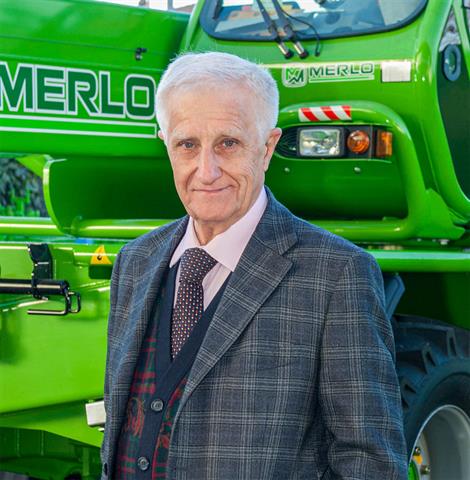 Amilcare Merlo is respectfully remembered
Amilcare Merlo is respectfully remembered
“When I was first hired to run this fine organisation, I never realised what an impact the industry and the association would have on my life. It's bittersweet for me to tell you that I have decided on a retirement date and we will be conducting a search for the replacement of the CEO,” she said in a video message to members.
B&B Attachments paid tribute to George Bell, who passed away on 5 October, surrounded by his loving family.
“George was loved by his family and friends, and it cannot be put into words the loss that is felt by his passing. In addition to his family, those of us who had the opportunity to work with George feel a tremendous loss,” the company said in a statement.
George and wife Irene Bell founded B&B Attachments in 1980. Trading first from their home in Headley, near Newbury, then expanding the business to Inkpen, Berkshire, they later opened an office in the Northeast of England, where George had been born.
In November, Amilcare Merlo, president and founder of the Merlo Group, passed away at the age of 88.
Family members described Merlo as “a brilliant and visionary entrepreneur with an innate curiosity and exceptional technical skills, thanks to which he led the development of numerous innovative projects in the field of agricultural and industrial mechanics that made him, to all intents and purposes, a leader in innovation and a pioneer in the sector”.
In December, the materials handling industry lost a valued adviser, with the passing of Bob Currie, founder and president of Currie Management Consultants. MHEDA described Currie as “a great resource and advisor to hundreds of materials handling professionals”, adding that his loss was felt by many who came to rely on his insight and expertise.
- Next week: What to expect in the year ahead – and how to prepare for it.